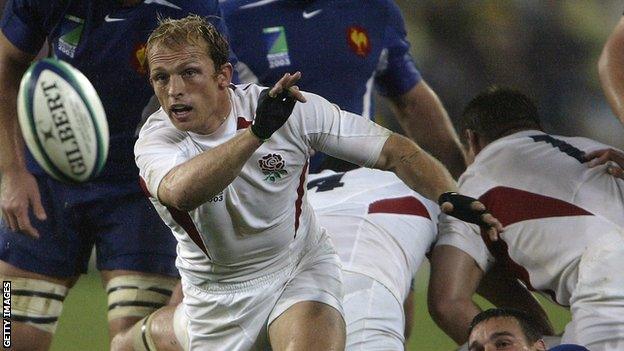Rugby and brain injuries: Matt Dawson says he was not let down by rugby union
- Published

Matt Dawson was part of the England side that won the 2003 World Cup in Australia
World Cup winner Matt Dawson insists he does not feel let down by rugby union even if he develops long-term brain damage as a result of playing the game.
The former England captain, 48, says he will not be joining a group of eight former players preparing a negligence claim against the sport's authorities, even though he has been "worried for a while" about his cognitive functions.
Speaking on the Rugby Union Weekly podcast, Dawson says it was his choice to play the game, and he "knew what he was getting into".
"No one forced me to do this," he said. "In my era they [the authorities] acted with their best knowledge of the scenario.
"I don't feel the game has let me down. The whole of my life is because I chose to play rugby, I'm a big boy, I made that decision.
"I picked my vocation and I will take the consequences, I'm owning up to them, I'm having them so I've got to deal with them.
"If they're bad then I've got to deal with them. But I'm not going to sit here and blame anyone, say it was anybody's fault. Whether I've got dementia now or whether I have it in 20 years."
Fellow World Cup winner Steve Thompson and seven ex-players claim the sport has left them with permanent brain damage.
It is understood a letter of claim, amounting to millions of pounds in damages, will be sent next week to the governing bodies for English and Welsh rugby and World Rugby - and a group class action could follow.
Dawson, who played alongside Thompson in England's victorious 2003 World Cup campaign in Australia, says while he won't be involving himself in the litigation, he has urged the game to look after those in need of care.
"I would love to see there being an outlet for these players to get help where they need it and that should be significantly funded," he said.
"This is a conversation that has been going on for decades. You say tip of the iceberg, everybody knows from pre-my era what the game was all about, how physical it was, what sort of contact and training we were involved in, it was absolutely inevitable.
"The people that are very close to me have known that I have been worried about it for a while just because there is an inevitability about it, from the characteristics I feel myself and listening to others."

